#Marx Brothers
Explore tagged Tumblr posts
Text
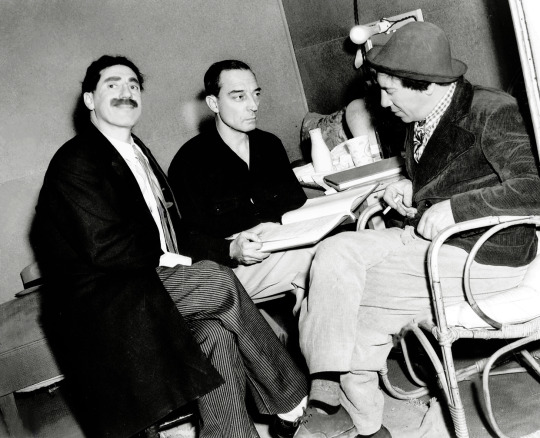
Buster Keaton (writer, uncredited), Groucho Marx, and Chico Marx during the making of "At the Circus" (1939)
#buster keaton#1930s#1910s#1920s#1920s hollywood#silent film#silent comedy#silent cinema#silent era#silent movies#pre code#pre code hollywood#pre code film#pre code era#pre code movies#damfino#damfinos#vintage hollywood#black and white#buster edit#old hollywood#slapstick#marx brothers#groucho marx#chico marx#at the circus#1939
220 notes
·
View notes
Text
Happy Public Domain Day 2025 to all who celebrate
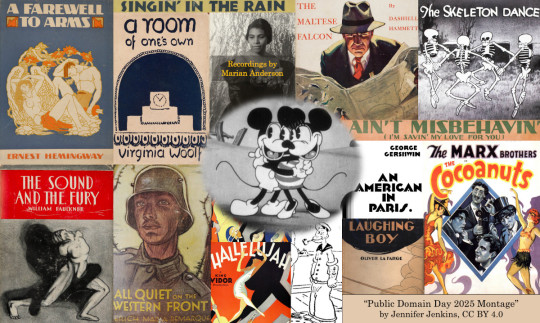
If you'd like an essay-formatted version of this post to read or share, here's a link to it on pluralistic.net, my surveillance-free, ad-free, tracker-free blog:
https://pluralistic.net/2024/12/17/dastar-dly-deeds/#roast-in-piss-sonny-bono

In 1976, Congress set fire to the country's libraries; in 1998, they did it again. Today, in 2024, the flames have died down, and out of the ashes a new public domain is growing. Happy Public Domain Day 2025 to all who celebrate!
For most of US history, copyright was something you had to ask for. To copyright a work, you'd send a copy to the Library of Congress and they'd issue you a copyright. Not only did that let you display a copyright mark on your work – so people would know they weren't allowed to copy it without your permission – but if anyone wanted to figure out who to ask in order to get permission to copy or adapt a work, they could just go look up the paperwork at the LoC.
In 1976, Congress amended the Copyright Act to eliminate the "formality" of copyright registration. Now, all creative works of human authorship were copyrighted "at the moment of fixation" – the instant you drew, typed, wrote, filmed, or recorded them. From a toddler's nursery-school finger-painting to a graffiti mural on a subway car, every creative act suddenly became an article of property.
But whose property? That was on you to figure out, before you could copy, publish, perform, or preserve the work, because without registration, permissions had to start with a scavenger hunt for the person who could grant it. Congress simultaneously enacted a massive expansion of property rights, while abolishing the title registry that spelled out who owned what. As though this wasn't enough, Congress reached back in time and plopped an extra 20 years' onto the copyrights of existing works, even ones whose authors were unknown and unlocatable.
For the next 20 years, creative workers, archivists, educators and fans struggled in the face of this regime of unknowable property rights. After decades of well-documented problems, Congress acted again: they made it worse.
In 1998, Congress passed the Sonny Bono Copyright Act, AKA the Mickey Mouse Preservation Act, AKA the Copyright Term Extension Act. The 1998 Act tacked another 20 years onto copyright terms, but not just for works that were still in copyright. At the insistence of Disney, Congress actually yanked works out of the public domain – works that had been anthologized, adapted and re-issued – and put them back into copyright for two more decades. Copyright stretched to the century-plus "life plus 70 years" term. Nothing entered the public domain for the next 20 years.
So many of my comrades in the fight for the public domain were certain that this would happen again in 2018. In 2010, e-book inventor and Project Gutenberg founder Michael S Hart and I got into a friendly email argument because he was positive that in 2018, Congress would set fire to the public domain again. When I insisted that there was no way this could happen given the public bitterness over the 1998 Act, he told me I was being naive, but said he hoped that I was right.
Michael didn't live to see it, but in 2019, the public domain opened again. It was an incredible day:
https://archive.org/details/ClosingKeynoteForGrandReopeningOfThePublicDomainCoryDoctorowAtInternetArchive
No one has done a better job of chronicling the fortunes of our fragile, beautiful, bounteous public domain than Jennifer Jenkins and James Boyle of Duke University's Center for the Study of the Public Domain. Every year from 2010-2019, Boyle and Jenkins chronicled the works that weren't entering the public domain because of the 1998 Act, making sure we knew what had been stolen from our cultural commons. In so many cases, these works disappeared before their copyrights expired, for example, the majority of silent films are lost forever.
Then, in 2019, Jenkins and Boyle got to start cataloging the works that were entering the public domain, most of them from 1923 (copyright is complicated, so not everything that entered the public domain in 2019 was from that year):
https://web.law.duke.edu/cspd/publicdomainday/2019/
Every year since, they've celebrated a new bumper crop. Last year, we got Mickey Mouse!
https://pluralistic.net/2023/12/15/mouse-liberation-front/#free-mickey
In addition to numerous other works – by Woolf, Hemingway, Doyle, Christie, Proust, Hesse, Milne, DuBois, Frost, Chaplin, Escher, and more:
https://pluralistic.net/2023/12/20/em-oh-you-ess-ee/#sexytimes
Now, 2024 was a fantastic year for the public domain, but – as you'll see in the 2025 edition of the Public Domain Day post – 2025 is even better:
https://web.law.duke.edu/cspd/publicdomainday/2025/
So what's entering the public domain this year? Well, for one thing, there's more of the stuff from last year, which makes sense: if Hemingway's first books entered the PD last year, then this year, we'll the books he wrote next (and this will continue every year until we catch up with Hemingway's tragic death).
There are some big hits from our returning champions, like Woolf's To the Lighthouse and A Farewell to Arms from Hemingway. Jenkins and Boyle call particular attention to one book: Faulkner's The Sound and the Fury, its title taken from a public domain work by Shakespeare. As they write, Faulkner spoke eloquently about the nature of posterity and culture:
[Humanity] is immortal, not because he alone among creatures has an inexhaustible voice, but because he has a soul, a spirit capable of compassion and sacrifice and endurance…The poet’s voice need not merely be the record of man, it can be one of the props, the pillars to help him endure and prevail.
The main attraction on last year's Public Domain Day was the entry of Steamboat Willie – the first Mickey Mouse cartoon – into the public domain. This year, we're getting a dozen new Mickey cartoons, including the first Mickey talkie:
https://en.wikipedia.org/wiki/Mickey_Mouse_(film_series)#1929
Those 12 shorts represent a kind of creative explosion for the Disney Studios. Those early Mickey cartoons were, each and every one, a hybrid of new copyrighted works and the public domain. The backbone of each Mickey short was a beloved, public domain song, with Mickey's motion synched to the beat (animators came to call this "mickey mousing"). In 1929, there was a huge crop of public domain music that anyone could use this way:
Blue Danube, Pop Goes the Weasel, Yankee Doodle, Here We Go Round the Mulberry Bush, Ach Du Lieber Augustin, Listen to the Mocking Bird, A-Hunting We Will Go, Dixie, The Girl I Left Behind Me, a tune known as the snake charmer song, Coming Thru the Rye, Mary Had a Little Lamb, Auld Lang Syne, Aloha ‘Oe, Turkey in the Straw, My Bonnie Lies Over the Ocean, Habanera and Toreador Song from Carmen, Lizst’s Hungarian Rhapsody No. 2, and Goodnight, Ladies.
These were recent compositions, songs that were written and popularized in the lifetimes of the parents and grandparents who took their kids to the movies to see Mickey shorts like "The Barn Dance," "The Opry House" and "The Jazz Fool." The ability to plunder this music at will was key to the success of Mickey Mouse and Disney. Think of all the Mickeys and Disneys we've lost by locking up the public domain for the past half-century!
This year, we're getting some outstanding new old music for our public domain. The complexities of copyright terms mean that compositions from 1929 are entering the public domain, but we're only getting recordings from 1924. 1924's outstanding recordings include:
George Gershwin performing Rhapsody in Blue, Jelly Roll Morton playing Shreveport Stomp, and an early recording from contralto and civil rights icon Marian Anderson, who is famous for her 1939 performance to an integrated audience of over 75,000 people at the Lincoln Memorial. Anderson’s 1924 recording is of the spiritual Nobody Knows the Trouble I’ve Seen.
While the compositions include Singin' in the Rain, Ain't Misbehavin', An American in Paris, Bolero, (What Did I Do to Be So) Black and Blue, Tiptoe Through the Tulips, Happy Days Are Here Again, What Is This Thing Called, Love?, Am I Blue? and many, many more.
On the art front, we're getting Salvador Dali's earliest surrealist masterpieces, like Illumined Pleasures, The Accommodations of Desire, and The Great Masturbator. Dali's contemporaries are not so lucky: after a century, the early history of the works of Magritte are so muddy that it's impossible to say whether they are in or out of copyright.
But there's plenty of art with clearer provenance that we can welcome into the public domain this year, most notably, Popeye and Tintin. As the first Popeye and Tintin comics go PD, so too do those characters.
The idea that a fictional character can have a copyright separate from the stories they appear in is relatively new, and it's weird and very stupid. Courts have found that the Batmobile is a copyrightable character (Batman won't enter the public domain until 2035).
Copyright for characters is such a muddy, gross, weird idea. The clearest example of how stupid this gets comes from Sherlock Holmes, whose canon spans many years. The Doyle estate – a rent-seeking copyright troll – claimed that Holmes wouldn't enter the public domain until every Holmes story was in the public domain (that's this year, incidentally!).
This didn't fly, so their next gambit was to claim copyright over those aspects of Holmes's character that were developed later in the stories. For example, they claimed that Holmes didn't show compassion until the later stories, and, on that basis, sued the creators of the Enola Holmes TV show for depicting a gender-swapped Sherlock who wasn't a total dick:
https://www.theguardian.com/books/2020/dec/22/lawsuit-copyright-warmer-sherlock-holmes-dismissed-enola-holmes
As the Enola lawyers pointed out in their briefs, this was tantamount to a copyright over emotions: "Copyright law does not allow the ownership of generic concepts like warmth, kindness, empathy, or respect, even as expressed by a public domain character – which, of course, belongs to the public, not plaintiff."
When Mickey entered the public domain last year, Jenkins did an excellent deep dive into which aspects of Mickey's character and design emerged when:
https://web.law.duke.edu/cspd/mickey/
Jenkins uses this year's entry of Tintin and Popeye into the public domain to further explore the subject of proprietary characters.
Even though copyright extends to characters, it only covers the "copyrightable" parts of those characters. As the Enola lawyers wrote, the generic character traits (their age, emotional vibe, etc) are not protected. Neither is anything "trivial" or "minuscule" – for example, if a cartoonist makes a minor alteration to the way a character's pupils or eyes are drawn, that's a minor detail, not a copyrightable element.
The biggest impediment to using public domain characters isn't copyright, it's trademark. Trademark is very different from copyright: foundationally, trademark is the right to protect your customers from being deceived by your competitors. Coke can use trademark to stop Pepsi from selling its sugary drinks in Coke cans – not because it owns the word "Coke" or the Coke logo, but because it has been deputized to protect Coke drinkers from being tricked into buying not-Coke, thinking that they're getting the true Black Waters of American Imperialism.
Companies claim trademarks over cartoon characters all the time, and license those trademarks on food, clothing, toys, and more (remember Popeye candy cigarettes?).
Indeed, Hearst Holdings claims a trademark over Popeye in many traditional categories, like cartoons, amusement parks, ads and clothes. They're also in the midst of applying for a Popeye NFT trademark (lol).
Does that mean you can't use Popeye in any of those ways? Nope! All you need to do is prominently mention that your use of Popeye is unofficial, not associated with Hearst, and dispel any chance of confusion. A unanimous Supreme Court decision (in Dastar) affirm your right to do so. You can also use Popeye in the title of your unauthorized Popeye comic, thanks to a case called Rogers v Grimaldi.
This all applies to Tintin, too – a big deal, given that Tintin is managed by a notorious copyright bully who delights in cruelly terrorizing fan artists. Tintin is joined in the public domain by Buck Rogers, another old-timey character whose owners are scumbag rent-seekers.
Congress buried the public domain alive in 1976, and dumped a load of gravel over its grave in 1998, but miraculously, we've managed to exhume the PD, and it has been revived and is showing signs of rude health.
2024 saw the blockbuster film adaptation of Wicked, based on the public domain Oz books. It also saw the publication of James, a celebrated retelling of Twain's Huck Finn from the perspective of Huck's enslaved sidekick.
This is completely normal. It's how art was made since time immemorial. The 40 year experiment in life without a public domain is at an end, and not a minute too soon.
You can piece together a complete-as-possible list of 2025's public domain (including the Marx Brothers' Cocoanuts, Disney's Skeleton Dance, and Del Ruth's Gold Diggers of Broadway) here:
https://onlinebooks.library.upenn.edu/cce/
#jennifer jenkins#duke center for the public domain#public domain day#trademark#tintin#popeye#copyfight#copyright#roast in piss sonny bono#james boyle#marx brothers#mickey mouse#ravel#bolero#faulkner#hemingway#virginia woolf#steinbeck#skeleton dance#gold diggers of broadway#dali#wicked
4K notes
·
View notes
Text

meme drawing
63 notes
·
View notes
Text

Harpo Marx as The Professor - Animal Crackers - 1930
66 notes
·
View notes
Text






A mensch by all accounts. Here’s to Arthur "Harpo" Marx (November 23, 1888 – September 28, 1964) ❤️
276 notes
·
View notes
Text

tiny groucho
130 notes
·
View notes
Text

373 notes
·
View notes
Text

Groucho Marx.
#the 30s#the 1930s#30s fashion#dancing#ballroom dancing#how to dance#formal wear#vintage formal wear#let’s dance#marx brothers#groucho marx#old movies#classic hollywood#old hollywood
117 notes
·
View notes
Text
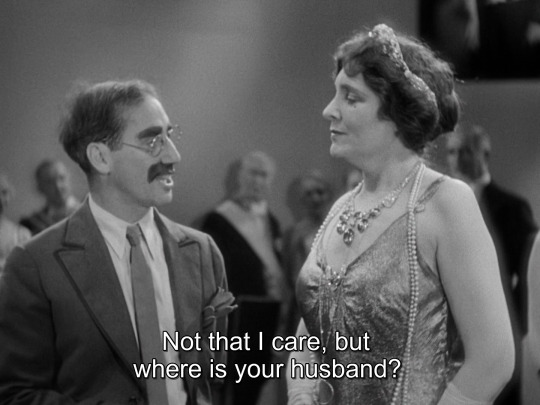
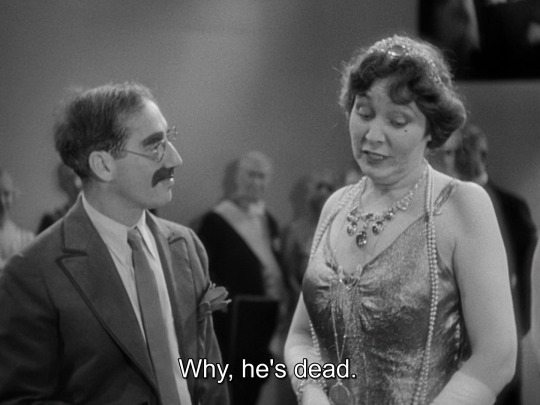
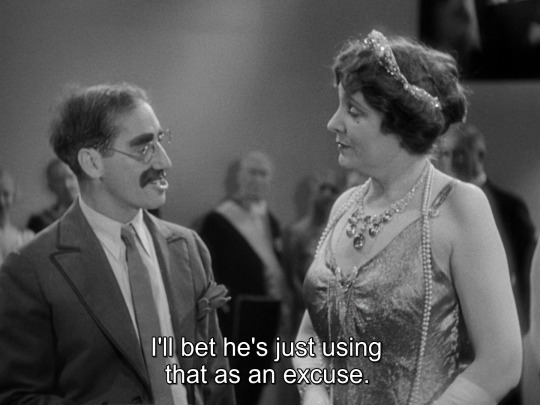
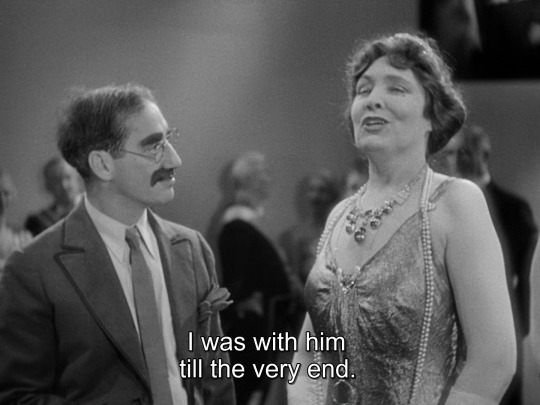
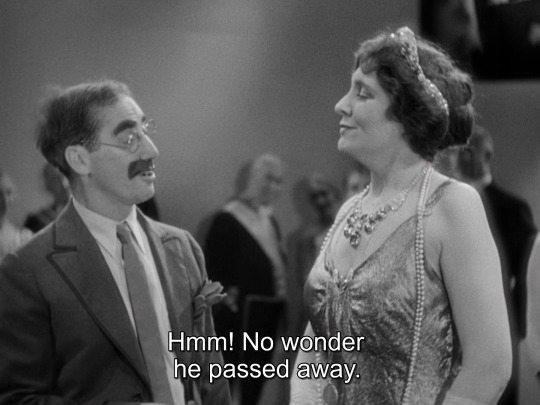
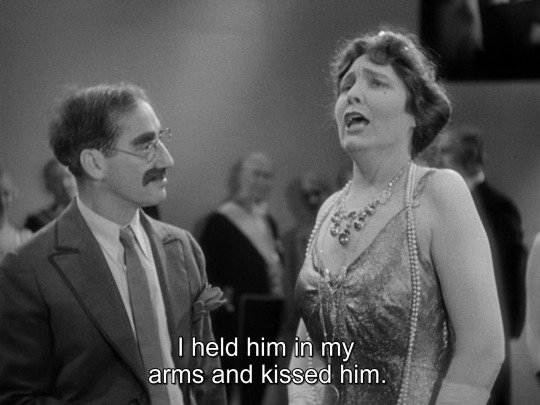
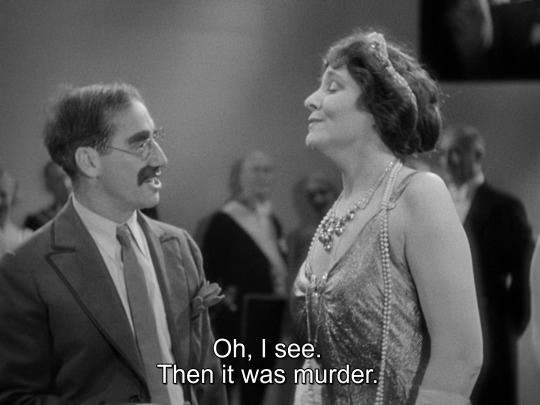
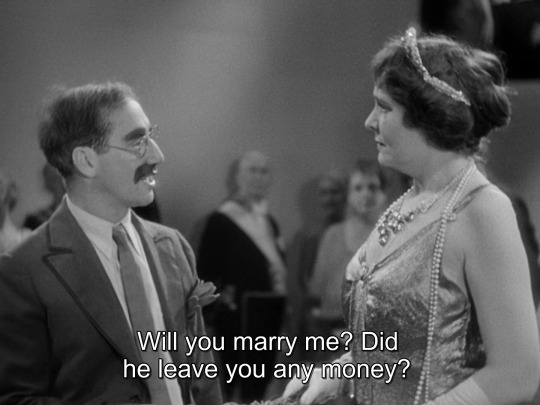
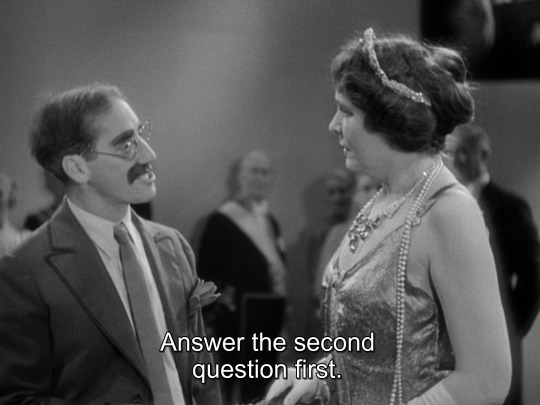
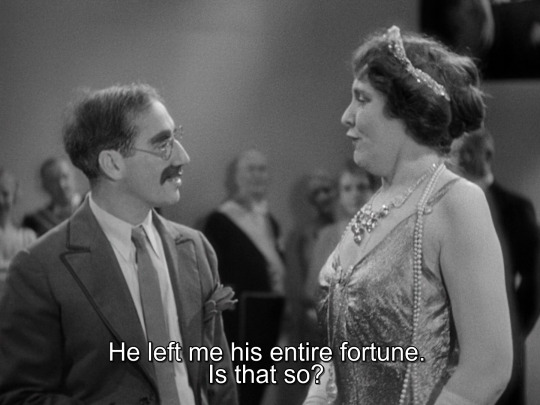
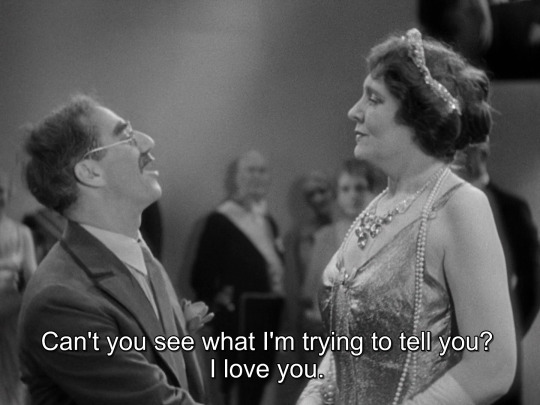
Duck Soup (Leo McCarey, 1933).
#duck soup#duck soup (1933)#groucho marx#leo mccarey#bert kalmar#harry ruby#marx brothers#Henry Sharp#leroy stone
228 notes
·
View notes
Text
I've always wondered if Sam Vimes' hardboiled egg was a reference to the Marx Brothers' hardboiled egg(s) in, I think, A Night At The Opera. Or maybe they're both references to something else. Or maybe they're just hardboiled eggs. But I've always wondered.
71 notes
·
View notes
Text
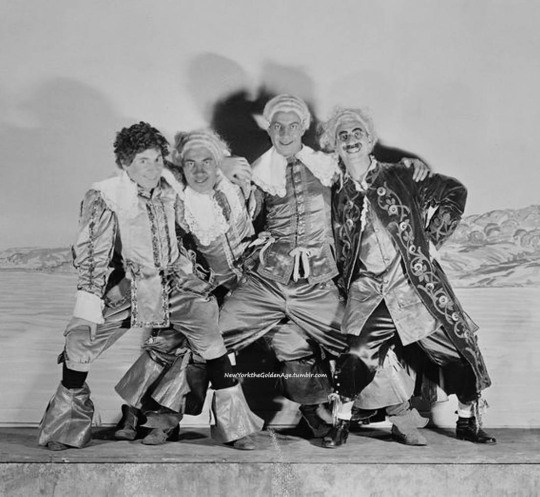
The Marx brothers: Harpo, Zeppo, Chico, and Groucho, in Animal Crackers, dressed as musketeers, 1928, at the 44th St. Theater. Book by George S. Kaufman & Morrie Ryskind. Music & lyrics by Bert Kolmar and Harry Ruby. Costumes by Mabel Johnston. Set by Raymond Sovey.
Margaret Dumont was also in the cast and, in the ensemble, a young dancer named Hermes Pan, who would go on to choreograph many of Fred Astaire's movies. The show ran for 191 performances, which in those days meant it was a great hit.
Photo: Vandamm via the NYPL
#vintage New York#1920s#Vandamm#Marx Brothers#Marx Bros.#Animal Crackers#Harpo Marx#Zeppo Marx#Chico Marx#Groucho Marx#vintage Broadway#Hermes Pan#vintage theater#Margaret Dumont#vintage NYC
160 notes
·
View notes
Text

At the Circus, 1939
Performing Lydia the Tattooed Lady.
GIF by BoomUnderground
#giphy#gif#groucho marx#marx brothers#harpo marx#dance#dancing#dancer#lydia the tattooed lady#movie#film#b&w#1939#1930s#at the circus#boomunderground
58 notes
·
View notes
Text

Harpo , Groucho, Chico, and Zeppo making an appearance as Arthur, Julius, Leonard and Herbert ❣️
#old hollywood#the marx brothers#leonard marx#zeppo marx#harpo marx#groucho marx#marx brothers#marxist#marxism#history
81 notes
·
View notes
Text




Arthur ‘Harpo’ Marx was born on November 23, 1888 #botd ❤️
139 notes
·
View notes

